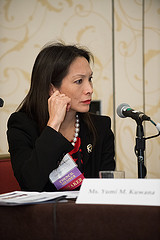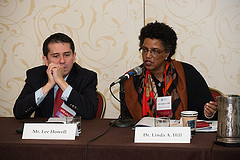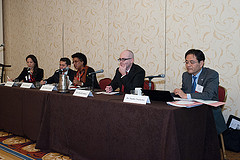Global Citizenship and Preparing Our Youth for Tomorrow
“Global Citizenship and Preparing our Youth for Tomorrow” was one of ten panel discussions that was held on October 4, 2013, during the 4th USJC Annual Conference.
Panelists
Moderator: Ms. Yumi M. Kuwana, Founding Principal, Cook Pine Capital LLC
Speakers: Dr. Linda A. Hill, Wallace Brett Donham Professor of Business Administration, Harvard Business School
Mr. Lee Howell, Managing Director, Member of the Managing Board, World Economic Forum
Dr. David Leheny, Henry Wendt III ‘55 Professor of East Asian Studies, Princeton University
Dr. Yutaka Tsujinaka, Executive Advisor to the President, University of Tsukuba
Description
What does it mean to become a Global Citizen? What tools do we need to navigate this complex and shrinking world? We need to think about Global Education and provide our next generation with the appropriate tools and knowledge to lead: a global mindset, language skills, cultural sensitivity, moral character and leadership skills. In order to prepare our youth for this increasingly globalized, digitalized and more complex world, it requires certain skills and tools in order to thrive in this 21st century world. This panel discussed these issues, how the U.S. and Japanese education systems are evolving in this globalized context, and how the U.S.-Japan Council can support our next generation’s education.
Summary
Special thanks to moderator Yumi Kuwana for providing this summary!
Global Citizenship and Global Education are topics of focus among leaders around the world. For example, in September 2013, the one year anniversary of the UN Secretary General’s Global Education First Initiative called for bold leadership and coordinated financing to achieve a breakthrough in education.
The “Global Citizenship and Preparing our Youth for Tomorrow” panel discussion was lively and diverse. The highlights are as follows:
Dr. Yutaka Tsujinaka commented on transnational citizenship, explaining how we are moving closer together and breaking down barriers with international exchange and travel. Yet, he said, because there are no voting rights on a global level to make decisions, accountability and recourse can be an issue. He said that some changes are taking place in Japan, such as some schools adopting September as the beginning of the new school year. However, he said, this has an impact on corporate recruiting, and changes may be slow.
Lee Howell commented that we are all part of an interdependent global community. With this comes responsibility on both the individual and country level, he said. Skills needed to succeed for the 21st century include: 1. Technology/Systems (being able to use technology and enable) 2. Synthesizing Skills (critical thinking and judgment) 3. Holistic Approach (making sense and meaning of news and issues).
Dr. David Leheny stated that it is via education that we can overcome biases and prejudices, but that we also need to be aware that “knowledge without goodness is dangerous.” Dr. Leheny is involved in a college exchange program between the U.S. and Japan, which is mobilizing students as global citizens, and looks forward to enhancing the program at Princeton.
Dr. Linda Hill, who studies leadership and the innovation of companies around the world, stated that we all have a “slice of genius” and that the challenge is to identify and nurture this. Our next generation needs: 1) A global mindset, while being grounded in their local community/family; 2) Flexibility and learning agility; 3) Critical thinking; 4) A moral compass; and 5) A sense of agency (to help others and be an agent of change). In this day and age of information overload, it is critical to think beyond the surface and be aware of the media and prejudices (aware of who is commenting and their voice/perception). For example, history is written by the victors and from the winner’s perspective.


